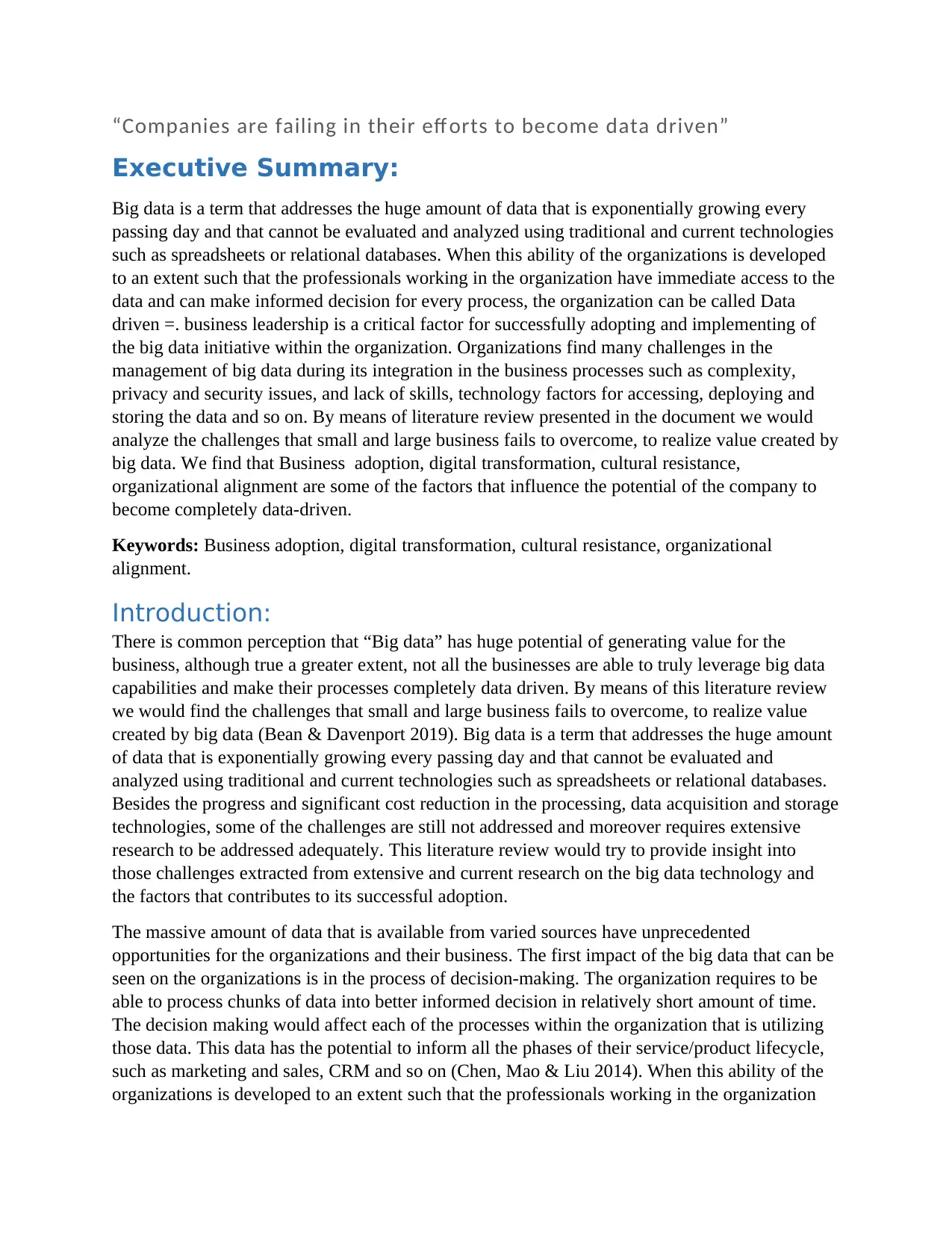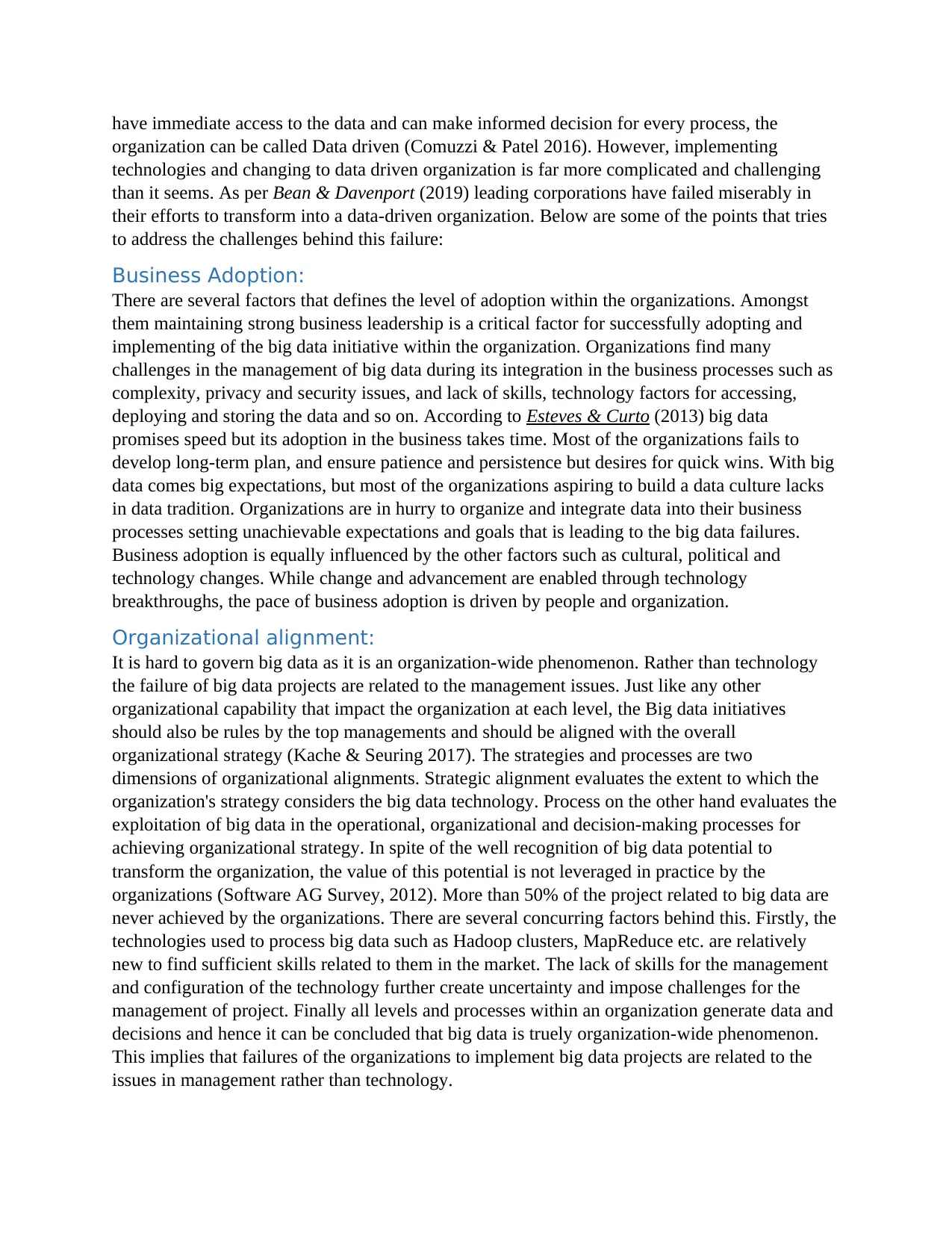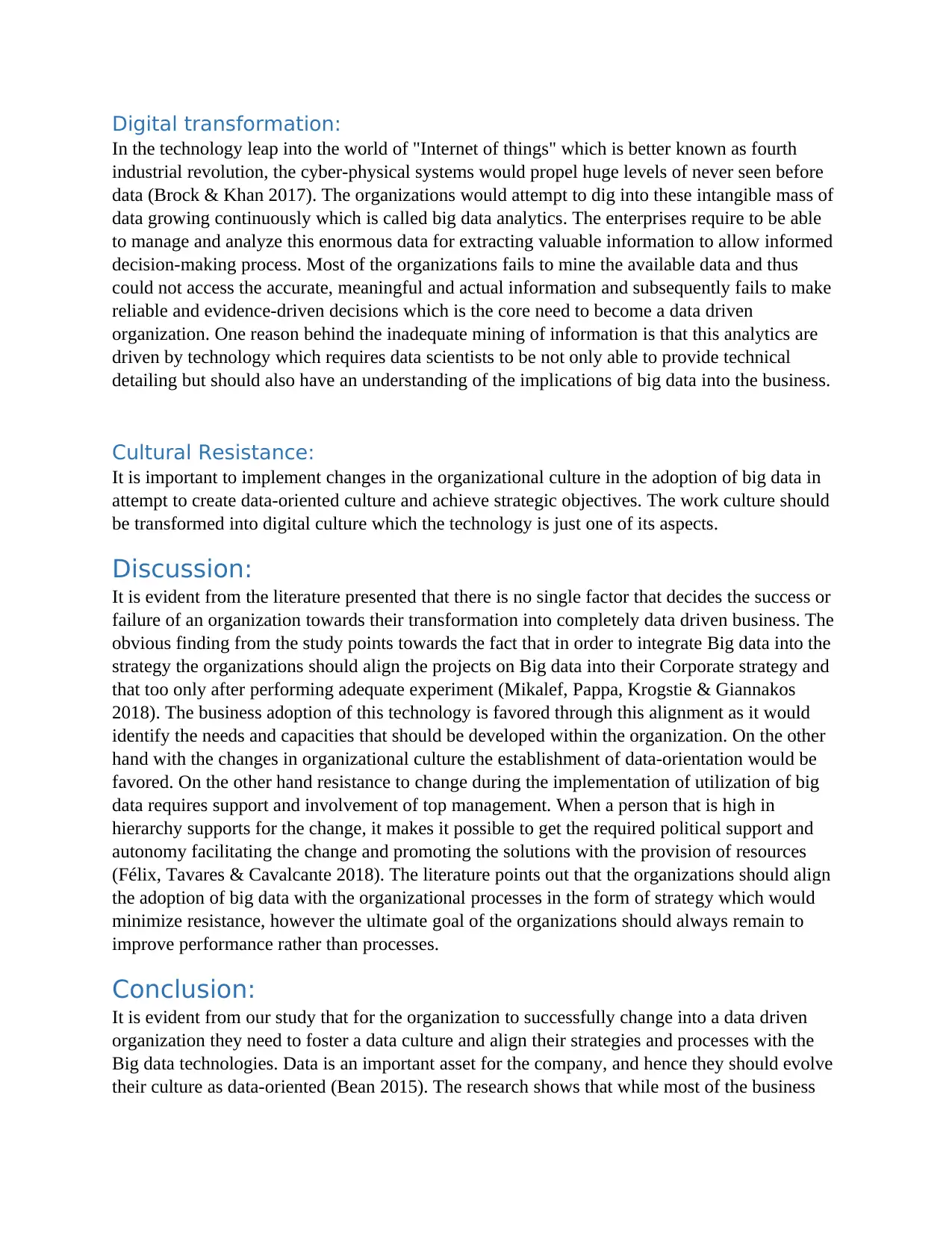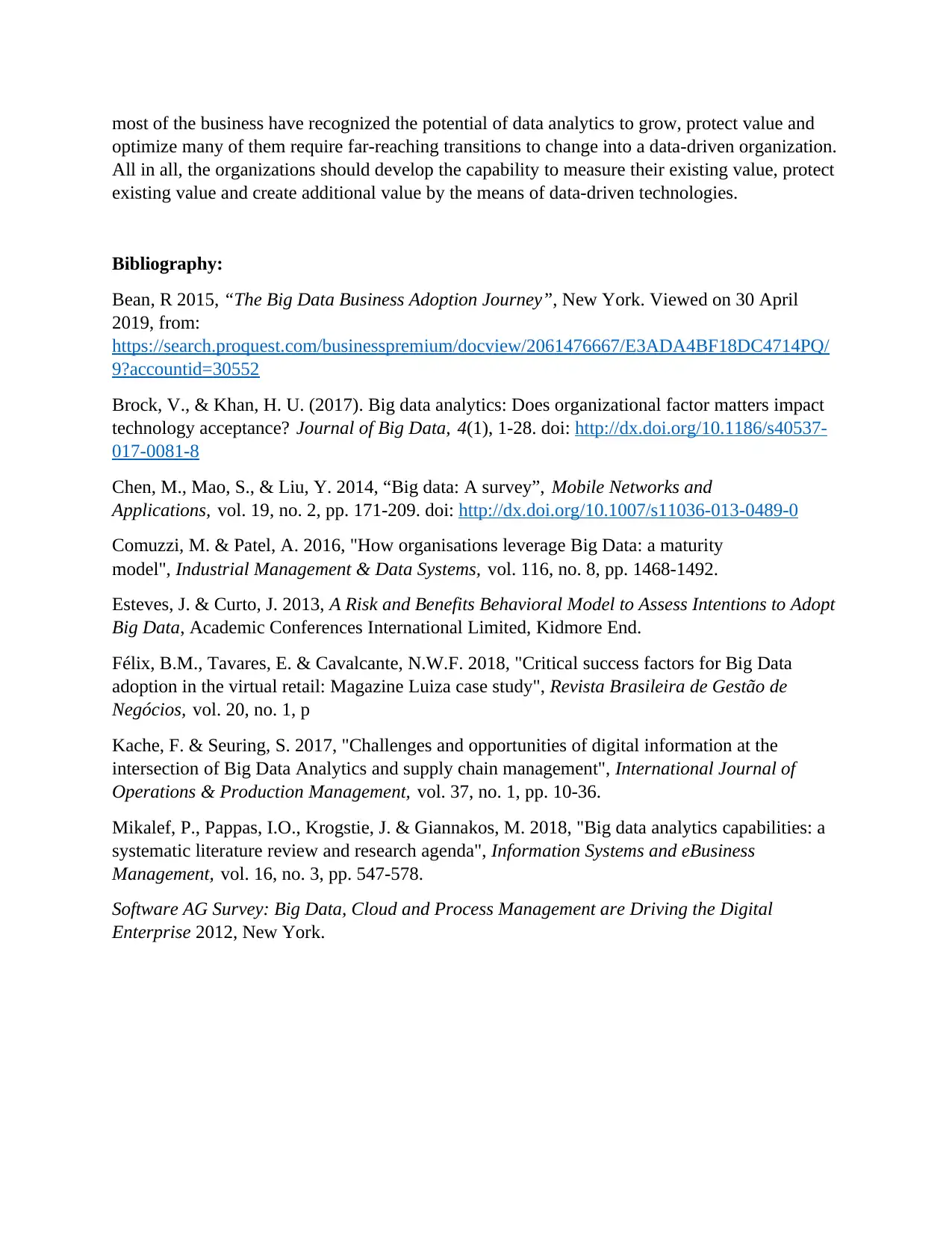Literature Review: Big Data Adoption Challenges in Modern Business
VerifiedAdded on 2023/01/20
|4
|2123
|56
Report
AI Summary
This report presents a literature review analyzing the challenges businesses face in their efforts to become data-driven. It examines the complexities of big data, the exponential growth of data, and the limitations of traditional technologies. The review explores factors influencing data-driven transformation, including business adoption, digital transformation, cultural resistance, and organizational alignment. The report highlights the importance of strong business leadership, organizational alignment with big data strategies, and the need for cultural shifts towards a data-oriented approach. It discusses the impact of digital transformation, the challenges of managing and analyzing vast amounts of data, and the importance of aligning big data projects with corporate strategies. The report concludes that successful data-driven transformation requires fostering a data culture and aligning strategies and processes with big data technologies, emphasizing the importance of measuring and creating value through data-driven technologies.

“Companies are failing in their eff orts to become data driven”
Executive Summary:
Big data is a term that addresses the huge amount of data that is exponentially growing every
passing day and that cannot be evaluated and analyzed using traditional and current technologies
such as spreadsheets or relational databases. When this ability of the organizations is developed
to an extent such that the professionals working in the organization have immediate access to the
data and can make informed decision for every process, the organization can be called Data
driven =. business leadership is a critical factor for successfully adopting and implementing of
the big data initiative within the organization. Organizations find many challenges in the
management of big data during its integration in the business processes such as complexity,
privacy and security issues, and lack of skills, technology factors for accessing, deploying and
storing the data and so on. By means of literature review presented in the document we would
analyze the challenges that small and large business fails to overcome, to realize value created by
big data. We find that Business adoption, digital transformation, cultural resistance,
organizational alignment are some of the factors that influence the potential of the company to
become completely data-driven.
Keywords: Business adoption, digital transformation, cultural resistance, organizational
alignment.
Introduction:
There is common perception that “Big data” has huge potential of generating value for the
business, although true a greater extent, not all the businesses are able to truly leverage big data
capabilities and make their processes completely data driven. By means of this literature review
we would find the challenges that small and large business fails to overcome, to realize value
created by big data (Bean & Davenport 2019). Big data is a term that addresses the huge amount
of data that is exponentially growing every passing day and that cannot be evaluated and
analyzed using traditional and current technologies such as spreadsheets or relational databases.
Besides the progress and significant cost reduction in the processing, data acquisition and storage
technologies, some of the challenges are still not addressed and moreover requires extensive
research to be addressed adequately. This literature review would try to provide insight into
those challenges extracted from extensive and current research on the big data technology and
the factors that contributes to its successful adoption.
The massive amount of data that is available from varied sources have unprecedented
opportunities for the organizations and their business. The first impact of the big data that can be
seen on the organizations is in the process of decision-making. The organization requires to be
able to process chunks of data into better informed decision in relatively short amount of time.
The decision making would affect each of the processes within the organization that is utilizing
those data. This data has the potential to inform all the phases of their service/product lifecycle,
such as marketing and sales, CRM and so on (Chen, Mao & Liu 2014). When this ability of the
organizations is developed to an extent such that the professionals working in the organization
Executive Summary:
Big data is a term that addresses the huge amount of data that is exponentially growing every
passing day and that cannot be evaluated and analyzed using traditional and current technologies
such as spreadsheets or relational databases. When this ability of the organizations is developed
to an extent such that the professionals working in the organization have immediate access to the
data and can make informed decision for every process, the organization can be called Data
driven =. business leadership is a critical factor for successfully adopting and implementing of
the big data initiative within the organization. Organizations find many challenges in the
management of big data during its integration in the business processes such as complexity,
privacy and security issues, and lack of skills, technology factors for accessing, deploying and
storing the data and so on. By means of literature review presented in the document we would
analyze the challenges that small and large business fails to overcome, to realize value created by
big data. We find that Business adoption, digital transformation, cultural resistance,
organizational alignment are some of the factors that influence the potential of the company to
become completely data-driven.
Keywords: Business adoption, digital transformation, cultural resistance, organizational
alignment.
Introduction:
There is common perception that “Big data” has huge potential of generating value for the
business, although true a greater extent, not all the businesses are able to truly leverage big data
capabilities and make their processes completely data driven. By means of this literature review
we would find the challenges that small and large business fails to overcome, to realize value
created by big data (Bean & Davenport 2019). Big data is a term that addresses the huge amount
of data that is exponentially growing every passing day and that cannot be evaluated and
analyzed using traditional and current technologies such as spreadsheets or relational databases.
Besides the progress and significant cost reduction in the processing, data acquisition and storage
technologies, some of the challenges are still not addressed and moreover requires extensive
research to be addressed adequately. This literature review would try to provide insight into
those challenges extracted from extensive and current research on the big data technology and
the factors that contributes to its successful adoption.
The massive amount of data that is available from varied sources have unprecedented
opportunities for the organizations and their business. The first impact of the big data that can be
seen on the organizations is in the process of decision-making. The organization requires to be
able to process chunks of data into better informed decision in relatively short amount of time.
The decision making would affect each of the processes within the organization that is utilizing
those data. This data has the potential to inform all the phases of their service/product lifecycle,
such as marketing and sales, CRM and so on (Chen, Mao & Liu 2014). When this ability of the
organizations is developed to an extent such that the professionals working in the organization
Paraphrase This Document
Need a fresh take? Get an instant paraphrase of this document with our AI Paraphraser

have immediate access to the data and can make informed decision for every process, the
organization can be called Data driven (Comuzzi & Patel 2016). However, implementing
technologies and changing to data driven organization is far more complicated and challenging
than it seems. As per Bean & Davenport (2019) leading corporations have failed miserably in
their efforts to transform into a data-driven organization. Below are some of the points that tries
to address the challenges behind this failure:
Business Adoption:
There are several factors that defines the level of adoption within the organizations. Amongst
them maintaining strong business leadership is a critical factor for successfully adopting and
implementing of the big data initiative within the organization. Organizations find many
challenges in the management of big data during its integration in the business processes such as
complexity, privacy and security issues, and lack of skills, technology factors for accessing,
deploying and storing the data and so on. According to Esteves & Curto (2013) big data
promises speed but its adoption in the business takes time. Most of the organizations fails to
develop long-term plan, and ensure patience and persistence but desires for quick wins. With big
data comes big expectations, but most of the organizations aspiring to build a data culture lacks
in data tradition. Organizations are in hurry to organize and integrate data into their business
processes setting unachievable expectations and goals that is leading to the big data failures.
Business adoption is equally influenced by the other factors such as cultural, political and
technology changes. While change and advancement are enabled through technology
breakthroughs, the pace of business adoption is driven by people and organization.
Organizational alignment:
It is hard to govern big data as it is an organization-wide phenomenon. Rather than technology
the failure of big data projects are related to the management issues. Just like any other
organizational capability that impact the organization at each level, the Big data initiatives
should also be rules by the top managements and should be aligned with the overall
organizational strategy (Kache & Seuring 2017). The strategies and processes are two
dimensions of organizational alignments. Strategic alignment evaluates the extent to which the
organization's strategy considers the big data technology. Process on the other hand evaluates the
exploitation of big data in the operational, organizational and decision-making processes for
achieving organizational strategy. In spite of the well recognition of big data potential to
transform the organization, the value of this potential is not leveraged in practice by the
organizations (Software AG Survey, 2012). More than 50% of the project related to big data are
never achieved by the organizations. There are several concurring factors behind this. Firstly, the
technologies used to process big data such as Hadoop clusters, MapReduce etc. are relatively
new to find sufficient skills related to them in the market. The lack of skills for the management
and configuration of the technology further create uncertainty and impose challenges for the
management of project. Finally all levels and processes within an organization generate data and
decisions and hence it can be concluded that big data is truely organization-wide phenomenon.
This implies that failures of the organizations to implement big data projects are related to the
issues in management rather than technology.
organization can be called Data driven (Comuzzi & Patel 2016). However, implementing
technologies and changing to data driven organization is far more complicated and challenging
than it seems. As per Bean & Davenport (2019) leading corporations have failed miserably in
their efforts to transform into a data-driven organization. Below are some of the points that tries
to address the challenges behind this failure:
Business Adoption:
There are several factors that defines the level of adoption within the organizations. Amongst
them maintaining strong business leadership is a critical factor for successfully adopting and
implementing of the big data initiative within the organization. Organizations find many
challenges in the management of big data during its integration in the business processes such as
complexity, privacy and security issues, and lack of skills, technology factors for accessing,
deploying and storing the data and so on. According to Esteves & Curto (2013) big data
promises speed but its adoption in the business takes time. Most of the organizations fails to
develop long-term plan, and ensure patience and persistence but desires for quick wins. With big
data comes big expectations, but most of the organizations aspiring to build a data culture lacks
in data tradition. Organizations are in hurry to organize and integrate data into their business
processes setting unachievable expectations and goals that is leading to the big data failures.
Business adoption is equally influenced by the other factors such as cultural, political and
technology changes. While change and advancement are enabled through technology
breakthroughs, the pace of business adoption is driven by people and organization.
Organizational alignment:
It is hard to govern big data as it is an organization-wide phenomenon. Rather than technology
the failure of big data projects are related to the management issues. Just like any other
organizational capability that impact the organization at each level, the Big data initiatives
should also be rules by the top managements and should be aligned with the overall
organizational strategy (Kache & Seuring 2017). The strategies and processes are two
dimensions of organizational alignments. Strategic alignment evaluates the extent to which the
organization's strategy considers the big data technology. Process on the other hand evaluates the
exploitation of big data in the operational, organizational and decision-making processes for
achieving organizational strategy. In spite of the well recognition of big data potential to
transform the organization, the value of this potential is not leveraged in practice by the
organizations (Software AG Survey, 2012). More than 50% of the project related to big data are
never achieved by the organizations. There are several concurring factors behind this. Firstly, the
technologies used to process big data such as Hadoop clusters, MapReduce etc. are relatively
new to find sufficient skills related to them in the market. The lack of skills for the management
and configuration of the technology further create uncertainty and impose challenges for the
management of project. Finally all levels and processes within an organization generate data and
decisions and hence it can be concluded that big data is truely organization-wide phenomenon.
This implies that failures of the organizations to implement big data projects are related to the
issues in management rather than technology.

Digital transformation:
In the technology leap into the world of "Internet of things" which is better known as fourth
industrial revolution, the cyber-physical systems would propel huge levels of never seen before
data (Brock & Khan 2017). The organizations would attempt to dig into these intangible mass of
data growing continuously which is called big data analytics. The enterprises require to be able
to manage and analyze this enormous data for extracting valuable information to allow informed
decision-making process. Most of the organizations fails to mine the available data and thus
could not access the accurate, meaningful and actual information and subsequently fails to make
reliable and evidence-driven decisions which is the core need to become a data driven
organization. One reason behind the inadequate mining of information is that this analytics are
driven by technology which requires data scientists to be not only able to provide technical
detailing but should also have an understanding of the implications of big data into the business.
Cultural Resistance:
It is important to implement changes in the organizational culture in the adoption of big data in
attempt to create data-oriented culture and achieve strategic objectives. The work culture should
be transformed into digital culture which the technology is just one of its aspects.
Discussion:
It is evident from the literature presented that there is no single factor that decides the success or
failure of an organization towards their transformation into completely data driven business. The
obvious finding from the study points towards the fact that in order to integrate Big data into the
strategy the organizations should align the projects on Big data into their Corporate strategy and
that too only after performing adequate experiment (Mikalef, Pappa, Krogstie & Giannakos
2018). The business adoption of this technology is favored through this alignment as it would
identify the needs and capacities that should be developed within the organization. On the other
hand with the changes in organizational culture the establishment of data-orientation would be
favored. On the other hand resistance to change during the implementation of utilization of big
data requires support and involvement of top management. When a person that is high in
hierarchy supports for the change, it makes it possible to get the required political support and
autonomy facilitating the change and promoting the solutions with the provision of resources
(Félix, Tavares & Cavalcante 2018). The literature points out that the organizations should align
the adoption of big data with the organizational processes in the form of strategy which would
minimize resistance, however the ultimate goal of the organizations should always remain to
improve performance rather than processes.
Conclusion:
It is evident from our study that for the organization to successfully change into a data driven
organization they need to foster a data culture and align their strategies and processes with the
Big data technologies. Data is an important asset for the company, and hence they should evolve
their culture as data-oriented (Bean 2015). The research shows that while most of the business
In the technology leap into the world of "Internet of things" which is better known as fourth
industrial revolution, the cyber-physical systems would propel huge levels of never seen before
data (Brock & Khan 2017). The organizations would attempt to dig into these intangible mass of
data growing continuously which is called big data analytics. The enterprises require to be able
to manage and analyze this enormous data for extracting valuable information to allow informed
decision-making process. Most of the organizations fails to mine the available data and thus
could not access the accurate, meaningful and actual information and subsequently fails to make
reliable and evidence-driven decisions which is the core need to become a data driven
organization. One reason behind the inadequate mining of information is that this analytics are
driven by technology which requires data scientists to be not only able to provide technical
detailing but should also have an understanding of the implications of big data into the business.
Cultural Resistance:
It is important to implement changes in the organizational culture in the adoption of big data in
attempt to create data-oriented culture and achieve strategic objectives. The work culture should
be transformed into digital culture which the technology is just one of its aspects.
Discussion:
It is evident from the literature presented that there is no single factor that decides the success or
failure of an organization towards their transformation into completely data driven business. The
obvious finding from the study points towards the fact that in order to integrate Big data into the
strategy the organizations should align the projects on Big data into their Corporate strategy and
that too only after performing adequate experiment (Mikalef, Pappa, Krogstie & Giannakos
2018). The business adoption of this technology is favored through this alignment as it would
identify the needs and capacities that should be developed within the organization. On the other
hand with the changes in organizational culture the establishment of data-orientation would be
favored. On the other hand resistance to change during the implementation of utilization of big
data requires support and involvement of top management. When a person that is high in
hierarchy supports for the change, it makes it possible to get the required political support and
autonomy facilitating the change and promoting the solutions with the provision of resources
(Félix, Tavares & Cavalcante 2018). The literature points out that the organizations should align
the adoption of big data with the organizational processes in the form of strategy which would
minimize resistance, however the ultimate goal of the organizations should always remain to
improve performance rather than processes.
Conclusion:
It is evident from our study that for the organization to successfully change into a data driven
organization they need to foster a data culture and align their strategies and processes with the
Big data technologies. Data is an important asset for the company, and hence they should evolve
their culture as data-oriented (Bean 2015). The research shows that while most of the business
⊘ This is a preview!⊘
Do you want full access?
Subscribe today to unlock all pages.

Trusted by 1+ million students worldwide

most of the business have recognized the potential of data analytics to grow, protect value and
optimize many of them require far-reaching transitions to change into a data-driven organization.
All in all, the organizations should develop the capability to measure their existing value, protect
existing value and create additional value by the means of data-driven technologies.
Bibliography:
Bean, R 2015, “The Big Data Business Adoption Journey”, New York. Viewed on 30 April
2019, from:
https://search.proquest.com/businesspremium/docview/2061476667/E3ADA4BF18DC4714PQ/
9?accountid=30552
Brock, V., & Khan, H. U. (2017). Big data analytics: Does organizational factor matters impact
technology acceptance? Journal of Big Data, 4(1), 1-28. doi: http://dx.doi.org/10.1186/s40537-
017-0081-8
Chen, M., Mao, S., & Liu, Y. 2014, “Big data: A survey”, Mobile Networks and
Applications, vol. 19, no. 2, pp. 171-209. doi: http://dx.doi.org/10.1007/s11036-013-0489-0
Comuzzi, M. & Patel, A. 2016, "How organisations leverage Big Data: a maturity
model", Industrial Management & Data Systems, vol. 116, no. 8, pp. 1468-1492.
Esteves, J. & Curto, J. 2013, A Risk and Benefits Behavioral Model to Assess Intentions to Adopt
Big Data, Academic Conferences International Limited, Kidmore End.
Félix, B.M., Tavares, E. & Cavalcante, N.W.F. 2018, "Critical success factors for Big Data
adoption in the virtual retail: Magazine Luiza case study", Revista Brasileira de Gestão de
Negócios, vol. 20, no. 1, p
Kache, F. & Seuring, S. 2017, "Challenges and opportunities of digital information at the
intersection of Big Data Analytics and supply chain management", International Journal of
Operations & Production Management, vol. 37, no. 1, pp. 10-36.
Mikalef, P., Pappas, I.O., Krogstie, J. & Giannakos, M. 2018, "Big data analytics capabilities: a
systematic literature review and research agenda", Information Systems and eBusiness
Management, vol. 16, no. 3, pp. 547-578.
Software AG Survey: Big Data, Cloud and Process Management are Driving the Digital
Enterprise 2012, New York.
optimize many of them require far-reaching transitions to change into a data-driven organization.
All in all, the organizations should develop the capability to measure their existing value, protect
existing value and create additional value by the means of data-driven technologies.
Bibliography:
Bean, R 2015, “The Big Data Business Adoption Journey”, New York. Viewed on 30 April
2019, from:
https://search.proquest.com/businesspremium/docview/2061476667/E3ADA4BF18DC4714PQ/
9?accountid=30552
Brock, V., & Khan, H. U. (2017). Big data analytics: Does organizational factor matters impact
technology acceptance? Journal of Big Data, 4(1), 1-28. doi: http://dx.doi.org/10.1186/s40537-
017-0081-8
Chen, M., Mao, S., & Liu, Y. 2014, “Big data: A survey”, Mobile Networks and
Applications, vol. 19, no. 2, pp. 171-209. doi: http://dx.doi.org/10.1007/s11036-013-0489-0
Comuzzi, M. & Patel, A. 2016, "How organisations leverage Big Data: a maturity
model", Industrial Management & Data Systems, vol. 116, no. 8, pp. 1468-1492.
Esteves, J. & Curto, J. 2013, A Risk and Benefits Behavioral Model to Assess Intentions to Adopt
Big Data, Academic Conferences International Limited, Kidmore End.
Félix, B.M., Tavares, E. & Cavalcante, N.W.F. 2018, "Critical success factors for Big Data
adoption in the virtual retail: Magazine Luiza case study", Revista Brasileira de Gestão de
Negócios, vol. 20, no. 1, p
Kache, F. & Seuring, S. 2017, "Challenges and opportunities of digital information at the
intersection of Big Data Analytics and supply chain management", International Journal of
Operations & Production Management, vol. 37, no. 1, pp. 10-36.
Mikalef, P., Pappas, I.O., Krogstie, J. & Giannakos, M. 2018, "Big data analytics capabilities: a
systematic literature review and research agenda", Information Systems and eBusiness
Management, vol. 16, no. 3, pp. 547-578.
Software AG Survey: Big Data, Cloud and Process Management are Driving the Digital
Enterprise 2012, New York.
1 out of 4
Related Documents
Your All-in-One AI-Powered Toolkit for Academic Success.
+13062052269
info@desklib.com
Available 24*7 on WhatsApp / Email
![[object Object]](/_next/static/media/star-bottom.7253800d.svg)
Unlock your academic potential
Copyright © 2020–2025 A2Z Services. All Rights Reserved. Developed and managed by ZUCOL.



